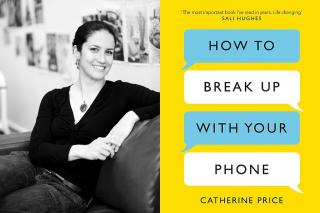Check out President Wooten's takeaways from the Community Read, and join us TONIGHT for a conversation and book signing with author Catherine Price!
- Do not feel guilty that you can’t resist your phone. This is not a reflection on your willpower or ability to focus, even if it means you struggle to focus on important tasks. Smartphones were designed to take advantage of our natural distractibility and hijack our attention.
- Using our phones to subdue our fear of missing out (FOMO) only increases our anxiety. As Price says, “Infected by FOMO, we keep checking and touching and swiping and scrolling, trying to relieve our anxiety by doing something that, by reinforcing our habit loop, actually only increases it.”
- Popular social media apps prey on our desire for approval. “Designers know that humans have an intrinsic desire for affirmation, and that the more ways there are for us to be judged, the more compulsively we’ll monitor our score….Put all of this together, and it makes sense that spending a lot of time on social media could be associated with depression and lower self-esteem.”
- Social media apps make money by grabbing your attention. “...Facebook does not have any intrinsic reason to care about whether the content that it’s helping its advertisers share with us is factually accurate. Instead, the goal is clicks. And when it comes to garnering clicks, the more sensational a post is, the better.” Also beware of “junkfood apps” that, as Price describes, “are fun or useful in limited quantities, but that are hard to stop using once you start.”
- Our phones encourage us to multitask, but attempting to focus on two things at the same time makes us ineffective. Research has shown that even self-professed “heavy multitaskers” lack the ability to ignore irrelevant information, keep information organized, and switch from one task to another. “And it appears that, by weakening our attention spans and our memories, our phones are damaging our ability to single-task, too.”
- “Frequent, focused distraction” is rewiring our brains. If you spend an hour on your phone, are you focused on just one task? More likely, you are toggling from one app to another, scrolling a social media feed, or clicking through one article to the next. “But that’s not to say that we only casually focus our attention on our phones. On the contrary, they completely absorb us. The result is what seems like should be an oxymoron: an intensely focused state of distraction.”
- Focus requires us to ignore distraction which, in itself, is tiring and difficult. Made more difficult when our smartphones are fully-loaded distraction machines. “...when mental fatigue causes us to give in to our brains’ natural preference for distraction — whether it’s by falling for clickbait or swiping over to social media — we reinforce the same mental circuits that made it hard to sustain our focus to begin with. We get better at not staying focused.”
- Mindfulness, and a focus on the present moment, can help us to separate ourselves from constantly checking our phones, or at least make us more aware of why we are doing so. “Paying deliberate attention to your moment-to-moment experience also gives you more fodder for memories that don’t involve your phone. It helps you deal with anxiety. It adds richness to your life.”
- Consider trying something new. Have you been bookmarking cupcake recipes, knitting patterns, audiobooks, yoga moves, and guitar tabs, but haven’t actually tried any of them? With less time spent searching for novelty on your phone, you may have the time to explore. What activities get you into a state of creative flow? What fascinated you as a kid? There can be room for that kind of joy in your life, today.
- Breaking up with your phone isn’t an all-or-nothing deal. “The point of breaking up with our phones isn’t to deprive ourselves of the benefits of modern technology. It’s to set boundaries so that we can enjoy the good parts of our phones while also protecting ourselves from the bad.”

